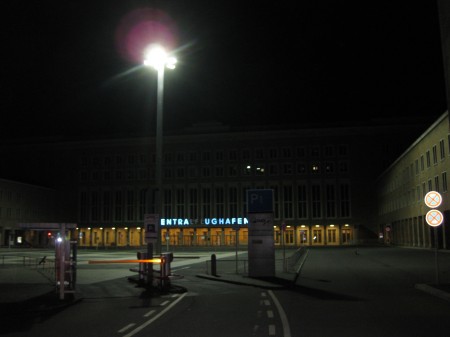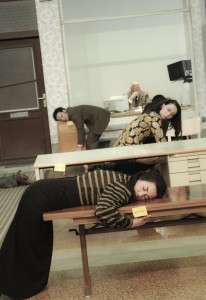To turn the old adage on its head, describing a play by Marthaler would be like dancing to architecture. Yes, we could concentrate on „Riesenbutzbach“’s formal gestures, yes, we could talk about the stage design and the costumes, yes, I could outline the „plot“, which is less of a plot than a series of impressions, and yes, I could copy/paste the festival’s description of the play; but none of this would come close to describing what Marthaler does to the viewer, none of this would replicate the experience nor make the beauty and urgency of it felt.
As a mystic once told me, dreams should be interpreted with dreams – and as such, we should perhaps interpret the poetry of Marthaler with the poetry of Oppen, we should appreciate the sad beauty of Anna Viebrock’s stage with the stages of Schlingensief and Meese (who are both undoubtedly indebted to Marthaler), we should tease out Marthaler’s composition with the music of Morton Feldman. And while I feel like this view is essentially correct, I also realize it does not bring you, the reader, any closer to Marthaler’s „Riesenbutzbach“ and its wonder. And as such, I will here do my best to describe the play, if only to convince you that its indescribable but worth seeing yourself.
Please forgive me if I forget a step in the dance and land on your toes.

The Airport after the Production. Photo: Shane Anderson
From my perspective, plot in this Marthaler piece was inconsequential; Marthaler is effective in exploring the problems we face not through declarations and manifestos but through questions, through transmitting emotions with the aid of movement, pictures and music.
Nevertheless, if one desired to summarize the play in a sentence, one could say that the main movement is an emptying, a rooting out and consequent examination of what’s left when everything we seemed to value is gone.
Hence, inside the „Institute for Fermentation“ that has gone bankrupt, we, the viewers, watch how the furniture of the institute is repossessed, how the workers/owners lament, how they sing as groups and argue, and how they show themselves off in a fashion show and then celebrate in the end.
What do they have in the end?
The clothes on their backs, each other (which doesn’t feel as warm and uplifting as a movie from the Great Depression might have had us believe), and songs. Songs, songs, songs.
But, and this seems decisive, the songs are never sung to the end.

Never Let Go. Photo: Dorothea Wimmer
In „Riesenbutzbach A Permanent Colony“ Marthaler demonstrates that he is an artist that works more with affect than with linear stories (à la Tennesse Williams) or rational arguments (à la Brecht). Marthaler moves delicately from one picture or musical moment to the next, exploiting these moments for their particular emotional color. Thus, we’re led from a sense of boredom and frustration (explored through the sighing and yawning of the actors), to desperation (an actor speaking French but no one understanding him, not even his mother), to hopefulness (the actors all smiling and singing and dancing in a small garage), and all of this is explored without the actors using any of these words or making any direct statements that one could categorize as belonging to these emotions. An example of how effective Marthaler is in his affective strategies can be witnessed in the play’s opening, when the women sigh or yawn and raise their legs. As I watched this drawn out scene, I too felt tired and bored and mildly frustrated. This affected mood certainly fit the „story“, and it was expressed not by a character directly saying anything like „oh no, what are we going to do?“ but by having the actors explore gestures to make this felt.
Though Anna Viebrock’s grandiose and nostalgic stage also expresses a certain affective potential, much of the emotional content in „Riesenbutzbach“ was poured out with music. Exploiting their voices to not only sing Lieder, songs and arias by composers like Bach, Schubert and Monteverdi, the actors also produced a number of compositions with their mouths by sighing or humming while others used their fingers on the wall to create a low rumbling noise. Spread out across the stage, these moments in „Riesenbutzbach“ reminded me more of a musical composition by Lachenmann or Nono than of a standard theater evening.
These musical moments were moments when rationality had to be abandoned and the body had to feel.
And though some were quick to complain of the poor acoustics of the ex-airport Tempelhof’s hangar, I’d be inclined to say that this was intentional, that words should not be concentrated on (nor heard very well from where I was sitting) for their rational meaning, that Marthaler was challenging us to let the sounds wash over us, to let their intonation and pronunciation affect our bodies.
But this isn’t to say that Marthaler didn’t address larger questions, that his piece was just one big emotional mess. In „Riesenbutzbach“, Marthaler used humor, absurdity, tenderness, fashion shows, classical music and boredom to deal with problems like stagnation, growth, optimism (most hilariously tackled with Casio keyboard versions of „Staying Alive“) and desperation. Likewise, it should come as no surprise that Marthaler sought out an „Institute for Fermentation“ as the place where these ideas took stage – for, after all, fermentation is a process of development but also one where compounds are broken down, where yeast cells die after they’ve served their purpose.
For me personally, ideas like these are entirely beside the point in „Riesenbutzbach“ – or rather, these ideas serve as a framework in which Marthaler explores an emotional landscape, a point of reference from where we can follow these ideas to their affective end. All of which is to say that Marthaler is a poet and not a philosopher or a politician. Marthaler suggests truths and does not drill them in.
„Riesenbutzbach A Permanent Colony“ left me absolutely devastated. I can’t remember the last time I saw such a sad, heartbreaking piece of theater. Thank you Christoph Marthaler.